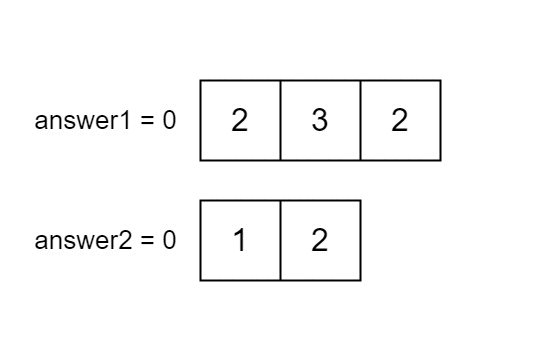Description
You are given two integer arrays nums1 and nums2 of sizes n and m, respectively. Calculate the following values:
answer1: the number of indicesisuch thatnums1[i]exists innums2.answer2: the number of indicesisuch thatnums2[i]exists innums1.
Return [answer1,answer2].
Example 1:
Input: nums1 = [2,3,2], nums2 = [1,2]
Output: [2,1]
Explanation:

Example 2:
Input: nums1 = [4,3,2,3,1], nums2 = [2,2,5,2,3,6]
Output: [3,4]
Explanation:
The elements at indices 1, 2, and 3 in nums1 exist in nums2 as well. So answer1 is 3.
The elements at indices 0, 1, 3, and 4 in nums2 exist in nums1. So answer2 is 4.
Example 3:
Input: nums1 = [3,4,2,3], nums2 = [1,5]
Output: [0,0]
Explanation:
No numbers are common between nums1 and nums2, so answer is [0,0].
Constraints:
n == nums1.lengthm == nums2.length1 <= n, m <= 1001 <= nums1[i], nums2[i] <= 100
Solution
Python3
class Solution:
def findIntersectionValues(self, nums1: List[int], nums2: List[int]) -> List[int]:
res1 = res2 = 0
s1 = set(nums1)
s2 = set(nums2)
for x in nums1:
if x in s2:
res1 += 1
for x in nums2:
if x in s1:
res2 += 1
return [res1, res2]